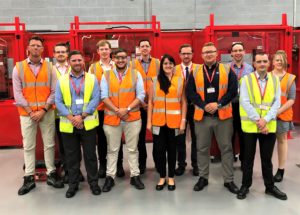Purposeful investment in young professionals could play a critical role addressing the skills shortage that threatens many engineering disciplines, according to the British Valve and Actuator Association.
As the Government-led Year of Engineering draws to a close, the BVAA says attracting young people to the profession isn’t enough in itself.
It suggests that employers also need to get more proactive about the strategic development of existing talent – especially people in the 20-to-30 age group. This should go beyond core practical skills to cover areas such as leadership, networking and horizon scanning.
BVAA chairman Colin Findlay says inter-industry collaboration can play an important role. He believes when young people have a broader awareness of an industry, it enables them to take a more constructive approach to career progression. This means they make better decisions and have a clearer perspective on the opportunities that will benefit them individually. Over time, they also make a more valuable contribution to the industry at large.
Since 2015, the BVAA has led a Future Leaders Programme to nurture promising young people employed by valve and actuator businesses in the UK.
Each year, 1 to 12 delegates are selected to join the programme, based on recommendation from their employers. They receive personal development training and mentoring, and they’re tasked with hosting an event at their workplace.

During the programme, they build relationships with peers and senior players from businesses that may be direct competitors of their own employer.
Findlay admits that some employers can be reticent to expose their best people to competitors, but he believes this attitude is misguided.
“We need to galvanise and empower people in their 20s and 30s, so that they’re ready to lead British industry into a successful future,” he explains. “That means giving them opportunities to expand their horizons, and to truly understand the depth and breadth of the industries they work in. It’s difficult to achieve this when they’re shackled to the workplace. But it can be achieved in collaboration with other businesses, when time and space is created for them to explore the wider potential and relevance of their industry.”
Findlay says the 2018 Year of Engineering initiative has done good work to highlight and address the 20,000 annual shortfall in graduate engineers.
However, there’s also an urgent need to tackle an impending leadership age gap in many sub-sectors.
“I applaud the Year of Engineering’s work to encourage more school age children of all genders and backgrounds to consider a career in this exciting field. But we also need to do more to support people who have already made this career choice, igniting their ambition and helping them step-up to take British engineering to new heights.”
The BVAA has represented the British valve and actuator industry for 80 years, and has around 200 members ranging from specialist SMEs to global engineering firms. The industry is a major STEM employer in the UK: 9,000 people are directly employed by valve and actuator businesses, and the industry contributes £3bn to the UK economy each year.
 Engineer News Network The ultimate online news and information resource for today’s engineer
Engineer News Network The ultimate online news and information resource for today’s engineer



